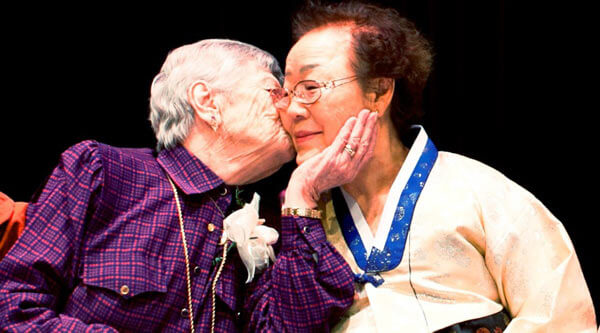By Phil Corso
History traveled more than 6,000 miles to meet face-to-face with students at Queensborough Community College.
Over the past year, students at the Bayside campus were able to hear the horrific stories of Korean and Chinese comfort women, who were kidnapped and forced into sexual slavery for the Japanese army during World War II. They were scheduled to take the lessons one step further this week when the women from South Korea flew to New York to meet the students in the company of college officials and elected leaders.
“Our students — several of whom had never heard of the Korean comfort women — were visibly shaken by what they learned during these interviews,” said Dr. Arthur Flug, executive director of the Kupferberg Holocaust Center and Archives, where the students were to have met the women in person Thursday. “The reactions are the same for our Holocaust survivor student interns who study the history of the Holocaust, interview survivors and then share their stories with others, ensuring that when the last survivor is gone their stories shall not be forgotten.”
Nine students at Queensborough took part in one of the college’s newest East Asia history internship program, pairing them up with comfort woman with the ultimate goal of keeping their stories alive. The program was launched in partnership with the advocacy group Korean American Civic Empowerment in the fall.
“It is a very important project for all of us,” Queensborough President Diane Call said. “This is an opportunity for our students to learn about history and the prejudice that can lead to horrifying results.”
Hephzibah Premkumar was one of the student interns who participated in the video interviews earlier this year and spoke with Ok Sun Lee, who told her story of suffering at the hands of soldiers in the Japanese Imperial Army during the war.
“I can never fully understand how Ok Sun Lee felt, but I know she thought of her family each day and feared for her life,” Premkumar said.
The exact number of how many women were kept as sex slaves has been a topic of debate, but Chejin Park, of the Korean American Voters’ Council, said it ranges between 20,000 and 200,000 depending on the source.
Controversy has long been at the center of the comfort women story and several of Queens’ elected officials have been fighting to recognize the memory of the victims.
City Councilman Peter Koo (D-Flushing) has long been pushing to name a street in his district in honor of the comfort women, but has yet to achieve that goal.
State Sen. Toby Stavisky (D-Flushing) joined with state Assemblymen Ed Braunstein (D-Bayside), Ron Kim (D-Flushing) and Charles Lavine (D-Glen Cove) last week at Queensborough to present a resolution honoring the college’s resource center for working on behalf of the comfort women.
It was a resolution that state Sen. Tony Avella (D-Bayside) came out in support of earlier this year, saying it was crucial for the state to recognize the horrific events as a part of history.
“We owe it to them,” Avella said of the victims. “And Japan owes it to them to apologize.”
Reach reporter Phil Corso by e-mail at pcorso@cnglocal.com or by phone at 718-260-4573.




































